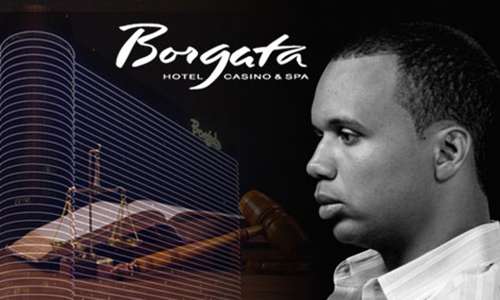Borgata, Phil Ivey Swap Claims in New Jersey Appellate Battle
The sprawling legal battle pitting Atlantic City’s Borgata Hotel & Casino against professional gambler Phil Ivey continues, with the two sides trading briefs in recent in their ongoing appellate case in New Jersey.
The New Jersey case now ongoing in the US Third Court of Appeals has found both sides trying to gain ground relative to the initial $10.13 million judgment granted to the Borgata over the “edge sorting” mini-baccarat card-identification scheme employed by Ivey and co-defendant “Kelly” Sun during four extended visits to the Borg in 2012.
In late July, counsel for Ivey and Sun, New Jersey attorney Louis M. Barbone, filed a 20-page brief that in essence is an an attempt to re-litigate the core findings of the December 2016 judgment. Barbone reasserted one of the defense’s core claims all along: Since neither Ivey nor Sun actually touched the cards, no actually “marking” of those cards occurred.
 Barbone also reemphasized claims that the Borgata was aware of the edge-sorting gambit employed by Ivey and Sun all along. As Barbone wrote, “Both parties to this ‘contract’ knew the underlying truth. Ivey and Sun certainly were attempting to gain ‘first card knowledge,’ and Borgata knew that. On their first day of play, Borgata’s surveillance reported just that. The surveillance supervisor believed that Ivey was attempting to gain first-card knowledge, but concluded that he had not… Each side entered the game with the identical intent — to win as much of the other’s money as possible.”
Barbone also reemphasized claims that the Borgata was aware of the edge-sorting gambit employed by Ivey and Sun all along. As Barbone wrote, “Both parties to this ‘contract’ knew the underlying truth. Ivey and Sun certainly were attempting to gain ‘first card knowledge,’ and Borgata knew that. On their first day of play, Borgata’s surveillance reported just that. The surveillance supervisor believed that Ivey was attempting to gain first-card knowledge, but concluded that he had not… Each side entered the game with the identical intent — to win as much of the other’s money as possible.”
Barbone later added, “Borgata, its corporate representatives, and surveillance personnel are just as savvy, experienced and knowledgeable as Mr. Ivey. Borgata has known for over 30 years that when it uses playing cards with patterned backs, none of them are perfect. Everyone in the industry knows that … Borgata could have used, or could have required, an ‘infinity edge,’ meaning there are no minute variances to compare because there is no pattern on the back of the playing cards.”
The problem with both the non-marking and unclean-hands claims, however, is that neither argument addresses the core elements of the initial ruling. That judgment was in essence an unwinding of the implied contract between the Borgata and its customers Ivey and Sun, on the grounds that the gamblers had effectively changed the odds of the game in violation of New Jersey’s gaming laws.
Earlier this month, the Borgata filed its own cross-appeal brief in the New Jersey matter. This latest brief addresses two areas in which the Borgata asserts that the case’s initial judge erred, and if corrected, would mean the Borgata is entitled to additional damages.
The first and smaller of the two Borgata claims that were dismissed was compensation for the extensive comps that the Borgata lavished upon Ivey and Sun, which ranged from a private jet to day trips and extensive spa, alcohol, and restaurant freebies. All that amounted to an astounding $249,199.83 in book value over the course of the pair’s four multi-day visits.
‘Borgata cross-appealed from the District Court’s order denying return of $249,199.83 worth of comps that Borgata provided to Ivey and Sun when they agreed to play high-stakes Baccarat,” wrote the casino’s counsel, Jeremy Klausner. “The ‘comps’ were part of the parties’ agreement—a component of what Ivey and Sun acknowledge as ‘the agreed and supplemental terms negotiated between the parties.’ … The District Court ruled that Ivey and Sun breached that agreement and ordered restitution.’
Of even larger potential impact is the Borgata reasserting its entitlement to a civil RICO (anti-organized crime) claim against Ivey and Sun, based on the fact that it was more than one person working in concert to cheat the casino. RICO statutes don’t require any actually participation in what one would think of as “organized crime” activity, meaning that civil RICO claims are often alleged when money-making schemes of a questionable nature end up in the courts.
Borgata would love to have a RICO claim affirmed since it would result in trebled damages, moving the initial judgment’s value into the $30 million range. Klausner wrote, “In its opening brief, Borgata showed that the District Court erred in dismissing Borgata’s RICO claims on the erroneous premise that they required predicate acts of fraud. Instead, the District Court should have recognized that the very same Casino Control Act (‘CCA’) violations that underlie the District Court’s contract ruling also satisfy the predicate act requirements under both the federal and state RICO statutes. Both the federal and New Jersey RICO statutes classify violations of state gambling statutes as RICO predicate acts.”
Unfortunately for this part of the Borgata’s claims, New Jersey investigators never attempted to prosecute Ivey and Sun for alleged CCA violations, whether civil or criminal. That left the initial presiding judge, US District Court Judge Noel L. Hillman, to sift through the arguments on other grounds, and his ruling restored the initial status quo because of the unknown (to the Borgata) shifting of the game’s odds.
Both of the recent briefs find each side’s counsel largely ignoring the arguments being offered by the other side. That’s not unusual in such a multi-faceted case, though it adds to the appellate court’s work in evaluating the claims.




















COMMENTS